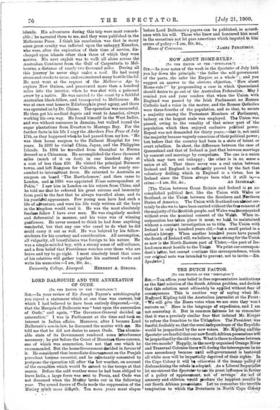. HOW ABOUT HOME-RITLE : ? : [To THE ENTon OP. TEM "
SPECTATOR."] SIA,—In your notes of the week.in the Spectator-of July WA youlay down the principle, "the -fuller the self-government of the parts, ,the safer the Empire as, a whole " ; and you suggest an anewer to the obvious: objection, "Row, about Home-rule ? " by: propounding a case. in which. Queensland should desire to.go out of the. Australian Federation,. gay I remind, you and your readers that when. the Union: with England was passed by the Irish Parliament _no -Reman Catholic had a voice in the matter, and the Roman Qatholica were three-fourths of the population, and so.that, to secure a majority among the Protestant Members of Farliameat, bribery on the largest scale was employed. The Union: was passed,. owing to. the venality of that .minor part of • the population which then enjoyed exclusive political power. Repeal was not demanded for thirty years,—that is, not.until the majority became vaguely conscious of their politicaLpower; but before that the country had been in a state of latent or overt rebellion. In Short, the . difference between the .rase ,of Queensland and that Of Ireland is just that between marriage by consent and marriage by compulsion. The one. is a.union which may turn out unhappy; the other is in no sense.a union .at all . That there never was a real union between Ireland and England is sufficiently proved by the fact that voluntary drilling, which. in England is a virtue, has in Ireland since the Union always been what it still is,—a aw.
[The Union between Great Britain and -Ireland complished political act, like the :Union with Wei 'Or Scotland, or the Union between the -Southern and Northern States of America. The Unicin with Scotland can aknost cer- tainly be shown to have been carried without the free oonsent cif the majorityof the Scottish people, and Wales was incorporated without even the nominal consent of the Welsh. When in corporation has taken place it must, we hold, be maintained without a constant investigation as to title, "Tire Union With Ireland is only a hundred years old,-.—but a small period in a nation's history. When another hundred year's have Passell the South of Ireland will, we believe, be as strong for the Uni6n as now is the North-Eastern part of 1T1ster,—the partnf Ire; land once most hostile to the Union. We print our correapon- dent's letter, but cannot continue this correspondence, which our original note was intended to prevent, not to invite.—ETh Spectator.] - - -


































 Previous page
Previous page